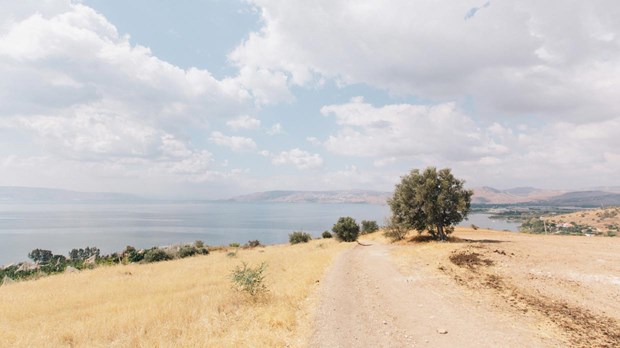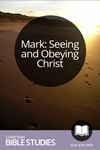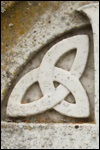A couple months ago I was standing in Jerusalem at the Garden Tomb. It was the last stop after a week of touring the Holy Land. My group spent most of its time seeing the sites of Jesus' ministry in northern Israel, with the Dead Sea, Qumran, and Masada thrown in.
Along the way, we befriended fellow pilgrims like the men of a Congolese church in Dublin we met in Galilee. When they found out we were also "born again," they gave us bear hugs, shouting "brother!" and "sister!" At Cana we met a Japanese woman with a church from Canada. She wept when she heard we were praying for Japan, hit by an earthquake and tsunami. We were all pilgrims traveling together on the road to holy sites.
The word pilgrim feels funny on Protestant lips. It makes me think of Islamic pilgrimages to Mecca, or Catholics visiting shrines to venerate relics, or John Bunyan's allegory. What does pilgrimage mean for a modern day Protestant? The concept of "thin places" is a helpful starting point.
The ancient Celts described thin places as spots where the veil between heaven and earth is lifted. During my trip to Israel, I felt I was going from thin place to thin place, unable to absorb it all. Capernaum, Galilee, Nazareth, Jerusalem; once just names, became real to me.
Many of the significant encounters with God in the Bible happened on mountains. It's where we get the expression "mountaintop experience." I had my share in Israel. I stood on the rippling hillside of the Mount of Beatitudes, looking down on the Sea of Galilee where Jesus crafted parables and fed thousands. I looked out on the Jezreel Valley from picturesque Mount Carmel where Elijah conquered the prophets of Baal. On the Mount of Olives, I viewed religious shrines squeezed together, radiating the Jerusalem sun. I felt like Moses, suddenly aware of the significance of the ground I was standing on.
But the most significant stop was not a mountain, but a garden. On our final day in Israel, we visited the Garden Tomb. It is the lone Protestant holy site in Jerusalem; a nondescript garden located in an Arab section of Jerusalem. There is a stone quarry with a skull-like impression just outside the garden and a tomb like one in Jesus' day. It's a reflective and worshipful place. Here, during our final hours in Israel, our group took communion together.
There is nothing about the garden that would draw the attention of passersby. Here it would be easy to confuse the incarnate Lord with a common gardener. Here, if someone didn't warn you that something significant was happening, you'd miss it completely. Yet, in a place much like the Garden Tomb, the most significant event in history occurred. Jesus went to the cross and tore the veil of separation between God and man. Standing in the garden and walking inside the empty tomb, I was reminded that we serve a risen Lord who walks with us now just as he did in that first garden: the Garden of Eden.
Living in Illinois, I can forget that. So much time and distance separate me from my Savior. But in Israel, the layers of time were peeled away, and I felt like I was experiencing the Bible in motion. The rich history of Israel heightened my sense of awareness. Seeing the places where Jesus walked helped me identify with him; to understand his parables; to see what his life would have been like; to know what he was giving up in leaving the rural beauty of Galilee to go to his death in the bustling city of Jerusalem. It helped me remember where I fit into the unfolding story of the gospel.
So back to the question. What does pilgrimage mean to a Protestant? It's a rich picture of our daily lives. Every new day is one more on the path to the New Jerusalem. It's seeing our salvation again through new eyes. The world has a way of making us forget what Christ achieved for us on the cross. We too often live like sleepwalkers, unaware of the world around us that crackles with the glory of God. Pilgrimage is a way of rubbing the sleep from our eyes; a refresher for the soul.
But even if you never make it to Israel, you can still take a pilgrimage. It's as easy as getting away to be with God. In essence, Jesus' death and resurrection made the whole earth a thin place. We no longer have to go to shrines, or mountains, or particular gardens to meet with God. We just have to still our minds and wake up to God invading his creation with love. Find your thin place, the place where you can leave your distractions at the door like Moses left his sandals. The God of the universe is waiting to walk with you in the cool of the day.
Jonathan Sprowl is a former editor of Men of Integrity.











